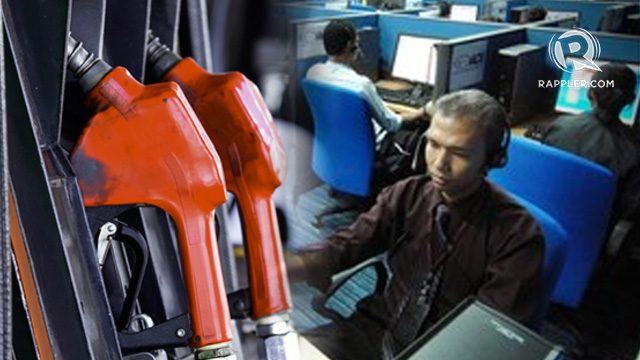SUMMARY
This is AI generated summarization, which may have errors. For context, always refer to the full article.

MANILA, Philippines – Here’s what you can expect from the Duterte administration’s proposed tax reform package: workers get to have a bigger take-home pay, but the prices of several commodities will increase.
The House of Representatives approved in May the changes in income and excise tax as proposed in House Bill (HB) 5636, promising a pro-poor initiative in reducing income tax. (READ: House passes reform bill, with higher tax rate for ‘super-rich’)
But labor unions expressed concern that the poor might be burdened by the higher prices of goods – particularly refined petroleum products, certain vehicles, and sugar-sweetened beverages – despite lower income tax.
Look at how HB 5636 will affect Filipinos:
Income tax
Those who earn P250,000 and below annually will be exempted from income tax. It means that if you earn around P20,833 or less every month, then no tax will be imposed on your salary.
What’s different in the new proposed tax schedule are the rates to cover the “super rich”.
In the current tax scheme, those who earn over P500,000 are required to pay P125,000 plus 32% of the excess over P500,000 – meaning, even the super rich who get multimillion salaries also follow that tax calculation.
The new proposed tax scheme has tax tiers covering those who earn over P800,000, over P2 million, and over P5 million.
Those who earn more than P5 million must pay P1,450,500 plus 35% of the excess over P5 million (effective 2018 to 2020). Starting 2021 onwards, they must pay P1,302,500 plus 35% of the excess over P5 million.
Meanwhile, self-employed individuals and professionals whose gross sales don’t exceed the value-added tax (VAT) threshold will pay an 8% income tax on gross sales in excess of P250,000.
Excise tax on automobiles
Vehicle ownership may be more difficult as excise tax on cars will go up significantly, ranging from 30% to 60%. Cars that cost less than P600,000 will have a 3% excise tax compared to the current 2%. (READ: Luxury car business grapples with ‘drastic’ tax hike proposal)
Meanwhile, automobiles worth over P3.1 million will be imposed a tax of P1,468,000 plus 90% of the value in excess of P3.1 million.
The excise tax on automobiles will increase by more than 10% to 20% in 2019.
Excise tax on fuel
Diesel fuel oil, liquefied petroleum gas, and bunker fuel oils that currently have no excise tax will have excise tax of P3 per liter of volume capacity.
Leaded premium gasoline, currently having a P5.35 excise tax, will get excise tax of P7 per liter of volume capacity.
Excise tax on aviation turbo jet fuels, waxes, and petrolatum will be at P7.
Other manufactured oils and fuels will also be subject to higher excise taxes, some by 100%.
The tax will gradually increase every year until 2020.
Excise tax on sugar-sweetened beverages
A food industry organization said the excise tax on sugar-sweetened beverages in the proposed tax reform package is the highest in the world. (INFOGRAPHIC: How tax reform hits your favorite drinks)
Sweetened juice drinks, carbonated beverages, flavored water, energy drinks, sports drinks, and cereal and grain beverages will have excise tax of P10 per liter. Sweetened tea and coffee are also included.
But products such as milk, infant formula, 100% natural fruit and vegetable juices, ground coffees, unsweetened teas, and meal replacement beverages are excluded from this tax.
Tax on fringe benefits
A 30% final tax will be imposed on the grossed-up monetary value of fringe benefits that a worker receives from the company. Fringe benefits refer to goods and services granted by an employer to his employee. These include vehicles, educational assistance to the employee or dependents, health insurance, social and athletic club memberships, and housing, among others.
By 2022 onwards, the fringe benefits must be included in the employee’s gross income, which will then be subject to the regular income tax rates.
Estate tax
An estate tax of 6% will be imposed on properties transferred from one person to another, whether by sale or through inheritance or donation.
While the House already approved the tax reform package, the Senate is unlikely to pass it anytime soon. Senators believe the measure would only hurt the poor. (READ: Senate won’t pass Malacañang’s version of tax reform bill) – Timothy Gucilatar / Rappler.com
Timothy Gucilatar is a Rappler intern.
Add a comment
How does this make you feel?
There are no comments yet. Add your comment to start the conversation.